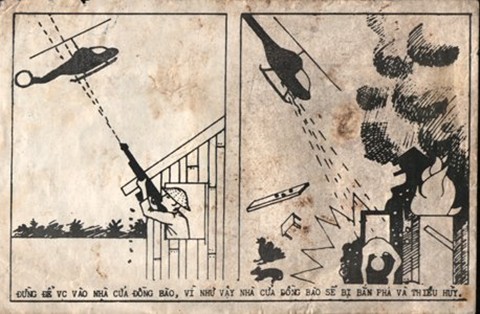
The advent of electronic media has apparently done little to diminish the use of propaganda leaflets during wartime. Over the first six weeks of the Iraq War, for example, the United States Air Force dropped 31.8 million leaflets, primarily geared toward encouraging conscripts to surrender and oil workers to resist scorched-earth orders. This June 2003 report claims the Iraqi leafleting was a worth the investment, though its evidence is strictly anecdotal. And that got us wondering as to whether anyone’s ever conducted an in-depth study of this particular brand of psyops, or if it’s just something that’s been done on faith since the advent of the airplane.
Our curiosity led us to a fascinating artifact of military scholarship: “Some Psychological Lessons from Leaflet Propaganda in World War II,” published 60 years ago in The Public Opinion Quarterly. The author was the lead writer for all of the American military’s World War II leaflets, and so thus could be expected to know a thing or two about the practice. And after debriefing scores of German civilians after the conflict ended, he drew some rather pointed conclusions about the limits of leafleting:
By far the most important category of targets, however-in point of numbers, at least-is the civilian population that can do nothing to end the war, consisting as it does of persons who cannot even remove themselves from the impact of bombing attacks. To threaten them-however gratifying
it may be to the enemy-hating propagandist-is psychologically unsound. Rather, the propagandist must seek, by continuous analysis of the patterns of life in the enemy country, to discover those actions which the enemy civilian can reasonably take in his own interest, and where his own interest coincides with ours. To find such actions may afford the key to propaganda to enemy civilians. In the absence of that key, most propaganda directed to enemy civilians will have little concrete effect on the course of a war. In fact, when it is considered that military defeats in any event constitute psychological blows of the first magnitude against the enemy civilian, it would seem that, prior to the time when mutual-interest situations begin to obtain, little can be gained from propaganda directed toward enemy civilians in wartime, except by way of building up credibility. Thus our enormous leaflet output which was dropped on Germany during the war, on which so little evidence of effectiveness has been obtained, can really be judged only in terms of whether it built up belief in our essential honesty. This confidence was needed in the final months of the war when we were in a position to exploit mutual-interest situations.
In other words, the only leaflets that have demonstrably positive results are those which a) clearly explain to civilians what they should do to better their lot, and b) list the reasons why such risks are worth taking. The blood and guts stuff, by contrast, is simply self-defeating.
A great compendium of leaflets dropped over Cambodia can be found here. And don’t miss this archive from the Malayan Emergency.
(Image via the Vietnam Helicopter Pilots Association)


Brian Moore // Dec 10, 2009 at 12:09 pm
I like how the intent of the helicopter image you posted varies drastically based on whether you think it goes left to right or vice versa.
Is it saying that “if you shoot at helicopters, they will blow up your house” or “helicopters are going to blow up your house, you should definitely shoot at them”?
Brendan I. Koerner // Dec 10, 2009 at 12:12 pm
Hmmmm, good point. I assume the caption clears things up, but then again, you’d expect that great number of Vietnamese villagers were illiterate. Psyops probably should’ve focus grouped this one before sending it off to the printer.
Brian Moore // Dec 10, 2009 at 12:19 pm
Honestly, given the way people really react to obvious propaganda, I think we shouldn’t drop leaflets, but rather DVDs of movies or tv shows. We can just pretend everyone in Iraq has subscribed to Netflix.
Brendan I. Koerner // Dec 10, 2009 at 12:25 pm
So, if you could have dropped just one movie on Iraq during the ’03 invasion, what would it have been? I’m thinking Requiem for a Dream—no way you can still have the will to fight after being brutalized by that flick.
Brian Moore // Dec 11, 2009 at 10:07 am
Oh man, the possibilities. I think that’s a good one, but then we risk destroying their ability to make a functioning state afterwards. I think I might go with Baywatch, not because I particularly like it, but it seems to be one of our nation’s greatest cultural ambassadors.
Fortune’s Supposed Favorites // Aug 23, 2010 at 10:20 am
[…] on the other side. Blame the overheated prose if you must, but perhaps written propaganda simply doesn’t stand much of a chance of altering hearts and […]
More Than Words Can Say | Microkhan by Brendan I. Koerner // Aug 5, 2011 at 9:15 am
[…] in 2009, I meditated upon the question of whether or not wartime propaganda leaflets are actually effective at weakening […]